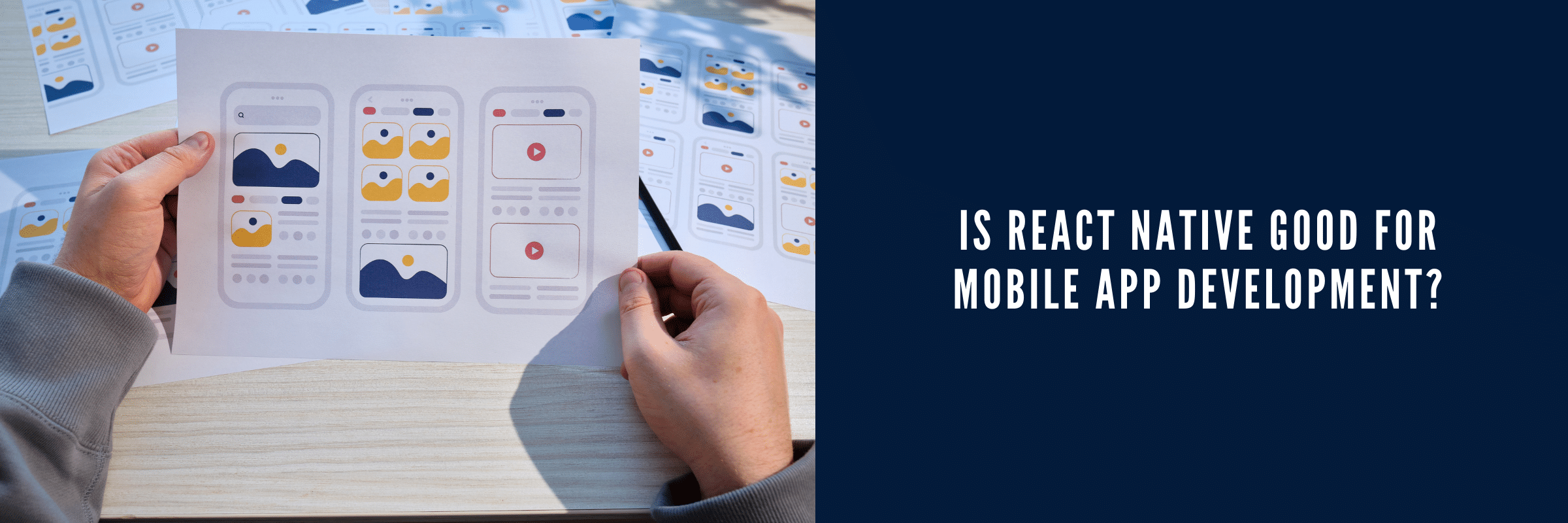
Is React Native Good for Mobile App Development?
Suprabhat Sen | November 21, 2023 , 11 min read
Table Of Content
Ever wondered if you could whip up a mobile app that works seamlessly on both iPhones and Android devices without tearing your hair out over different codebases?
Enter React Native: the genie granting developers’ wishes since 2015! It’s like having a magic wand that lets you build native mobile apps using good ol’ JavaScript and React.
Expected global mobile users by 2025: 7.49 billion for Android and iOS combined. Average user spends 4.8 hours daily on mobile apps.
Developed by the brainiacs at Facebook, React Native has become the go-to framework for building mobile apps across various industries. Picture this: writing code once and using it for both iOS and Android platforms – talk about a game-changer!
Now, it might not be the perfect match for every project, but for those in the know-how of web development with React, this framework’s like finding a treasure chest full of possibilities. Companies left, right, and center have embraced React Native for its efficiency in crafting feature-rich mobile apps. So, if you’re eyeing a mobile app development journey, React Native might just be your trusty sidekick!
Why is React Native so Popular?
React Native is an Open Source framework for Mobile application development. It provides a cheap and fast track to completion and works well on targeted platforms — making it ideal for businesses partnering with a React Native App Development Company to build high-quality cross-platform apps.
React Native has become popular for several reasons, contributing to its widespread adoption in the development community.
Here are some key factors that have contributed to the popularity of React Native:
- Cross-Platform Development
- JavaScript and React Community
- Performance Improvements
- Large Ecosystem and Third-Party Libraries
- Facebook’s Backing
- Declarative UI and Component-Based Architecture
- Community Support
- Adoption by Major Companies
Read more about: Benefits of React Native for Mobile App Development
Advantages of Using React Native for Mobile App Development
React Native offers several advantages for mobile app development, making it a popular choice among developers. Here are some key advantages:
1. Cross-Platform Development
One of the most significant advantages of React Native is its ability to support cross-platform development. With a single codebase, developers can build and deploy apps on both iOS and Android platforms, reducing development time and costs.
2. Code Reusability
React Native allows for a high degree of code reusability. Developers can share a substantial portion of their codebase between iOS and Android, including business logic and some user interface elements. This can lead to more efficient development and easier maintenance.
3. JavaScript and React Knowledge
If you’re already familiar with JavaScript and React, the learning curve for React Native is relatively low. Developers with experience in web development using React can leverage their existing skills to build mobile applications.
4. Hot Reloading
React Native supports hot reloading, enabling developers to see the results of their code changes almost instantly without restarting the entire application. This feature accelerates the development process and improves developer productivity.
5. Declarative UI and Component-Based Architecture
React Native follows a declarative programming paradigm, making it easier to understand and manage UI components. The component-based architecture promotes code modularity, reusability, and easier maintenance.
6. Native Performance
While React Native apps are not fully native, they interact with native components through a bridge. This allows React Native to achieve performance comparable to native apps, especially for most common use cases. Additionally, ongoing updates and optimizations continue to enhance performance.
7. Large Ecosystem and Community Support
React Native benefits from a large and active community, which contributes to a rich ecosystem of third-party libraries, plugins, and tools. This community support can help developers find solutions to common challenges and accelerate development.
8. Facebook’s Backing
React Native is developed and maintained by Facebook, providing a level of credibility and support. The involvement of a major tech company often instills confidence in developers and businesses considering the framework for their projects.
9. Rapid Development
With the combination of hot reloading, a declarative syntax, and the ability to use pre-built components, React Native facilitates rapid development. Developers can quickly iterate on their code and see changes in real-time, streamlining the development process.
10. Easy Integration with Native Modules
React Native allows developers to incorporate native modules when necessary. This flexibility is useful for accessing device-specific functionalities that may not be available through standard React Native components.
Also Read: How long does it take to develop an app in 2023?
Drawbacks of Using React Native
While React Native has numerous advantages, it also comes with some drawbacks that developers and businesses should consider when deciding on a mobile app development framework. Here are some of the drawbacks of using React Native:
- Limited Access to Native APIs: Although React Native provides a way to use native modules when needed, there might be scenarios where certain device-specific features or APIs are not readily available or well-supported. In such cases, developers may need to write native modules or consider alternative solutions.
- Performance Concerns: While React Native offers good performance for many applications, it may not match the performance of fully native applications in all scenarios. Intensive graphics, complex animations, or applications with high-performance requirements may face challenges in achieving the same level of performance as fully native apps.
- Learning Curve for Native Modules: Integrating native modules into a React Native project may require knowledge of native languages (Java for Android, Swift or Objective-C for iOS). Developers who primarily work with JavaScript may face a learning curve when dealing with native code.
- Large App Size: React Native apps can have larger file sizes compared to their native counterparts. The framework includes a JavaScript engine, and apps often need to bundle a significant amount of JavaScript code. This can lead to larger app sizes, which may be a concern for users with limited storage space.
- Dependency on Third-Party Modules: While the React Native community provides a wide range of third-party libraries and modules, relying on these can introduce dependencies that may not be well-maintained or may have compatibility issues with future updates of React Native.
- Delay in Implementing New Features: React Native may not immediately support the latest features or updates introduced by iOS or Android platforms. Developers may need to wait for the React Native framework to incorporate these changes before they can take advantage of new functionalities.
- Debugging Challenges: Debugging can be challenging in React Native, especially when dealing with native modules. The development environment may not be as seamless as debugging pure JavaScript, and issues can sometimes be harder to trace.
- Less Control Over Native Elements: While React Native provides a way to interact with native components, developers may have less control over the fine details of the native UI elements compared to fully native development.
- Community and Library Quality: While the React Native community is large and active, the quality of third-party libraries can vary. Some libraries may be well-maintained and thoroughly tested, while others may be less reliable. It’s crucial to carefully evaluate and choose libraries to avoid potential issues.
- Security Concerns: As with any open-source framework, there may be security concerns. Developers need to stay vigilant about keeping dependencies up to date to patch any security vulnerabilities that may be discovered.
Despite these drawbacks, React Native remains a popular choice for many mobile app development projects, and developers often find that the benefits outweigh the challenges. The suitability of React Native depends on the specific requirements and constraints of the project, as well as the preferences and expertise of the development team.
Is React Native best choice for mobile app development?
Whether React Native is the best choice for mobile app development depends on various factors, including the specific requirements of your project, your team’s expertise, and your priorities.
React Native is a powerful and popular framework, but it may not be the best fit for every scenario.
Here are some considerations to help you decide:
When React Native Might Be the Best Choice:
- Cross-Platform Development: If you want to develop a mobile app for both iOS and Android platforms and leverage a single codebase for efficiency, React Native is an excellent choice. It allows you to share a significant portion of your codebase across platforms.
- Web Developers Using React: If your team is already familiar with React for web development, transitioning to React Native for mobile development can be relatively smooth. The skills are transferable, and developers can reuse knowledge and components.
- Rapid Prototyping and Time-to-Market: React Native, with its hot reloading feature and code reusability, is well-suited for rapid prototyping and speeding up the development cycle. This can be advantageous when time-to-market is a critical factor.
- Community and Ecosystem: React Native has a large and active community, contributing to a rich ecosystem of third-party libraries, plugins, and tools. This can be beneficial for finding solutions to common challenges and accelerating development.
- Apps with Moderate Performance Requirements: For many applications, React Native provides satisfactory performance. If your app doesn’t have extremely high-performance requirements, such as intense graphics or real-time gaming, React Native can be a good fit.
Looking to hire professional ReactJS developers? We can help!
When React Native Might Not Be the Best Choice:
- High-Performance Requirements: If your app requires extremely high performance, such as complex graphics, intense animations, or real-time processing, a fully native solution might be more suitable.
- Access to Native APIs: If your app heavily relies on specific device features or APIs that are not well-supported by React Native, you might face challenges. In such cases, a native development approach might offer more flexibility.
- Existing Native Codebase: If you already have a significant investment in native code for iOS or Android, the overhead of integrating React Native into an existing codebase might outweigh the benefits of cross-platform development.
- Small App Size Requirement: If minimising the app size is a critical requirement, React Native apps can sometimes have larger file sizes compared to fully native apps due to the inclusion of the JavaScript engine.
- Preference for Native Look and Feel: If achieving a pixel-perfect, platform-specific look and feel is a top priority, fully native development might be a better choice. React Native provides a native-like experience, but there may be subtle differences.
Conclusion
In conclusion, React Native is a powerful and widely adopted framework for mobile app development, known for its ability to enable cross-platform development, code reusability, and rapid prototyping. Its popularity is driven by advantages such as a large and active community, compatibility with JavaScript and React, and the support of major companies like Facebook.
However, it’s essential to acknowledge the framework’s limitations, including potential performance challenges for highly demanding applications, the need for native modules in certain scenarios, and considerations related to app size and access to specific device features.
The decision to use React Native should be based on a careful assessment of project requirements, team expertise, and development priorities.
While React Native excels in scenarios that prioritise efficiency, cross-platform compatibility, and a quick development cycle, there are situations where a fully native approach or alternative frameworks might be more suitable.
Ultimately, the best choice depends on the unique characteristics of each project and the trade-offs that align with its goals and constraints.
Developers should weigh the benefits and drawbacks discussed earlier to make an informed decision based on their specific use case.
Do you have an app idea you’d like to discuss? Let’s have a free consultation! Chat with us now.
Get in touch with ScaleupAlly to avail our mobile app development services to bring your app idea to reality.
Frequently Asked Questions
Q: Is it feasible to achieve a pixel-perfect design and platform-specific user experience using React Native?
React Native provides a native-like experience, but achieving pixel-perfect design aligned with platform-specific UI nuances might have limitations. For projects where platform-specific design and user experience are top priorities, native development might offer better control over fine details.
Q: Can React Native apps access all device-specific features and APIs without complications?
React Native allows access to most device features through native modules. However, some specific or newly released device features might not be readily available, requiring additional development effort or native code integration. For apps heavily relying on exclusive or intricate device functionalities, thorough evaluation of React Native’s compatibility is advisable.
Q: Is React Native suitable for apps that demand the latest platform features immediately upon release by iOS or Android?
React Native may not instantly incorporate the newest platform features upon release. Developers often need to wait for updates or rely on community contributions to implement these features. For projects prioritizing immediate integration of cutting-edge platform functionalities, native development or other frameworks that quickly adopt these updates could be more suitable.
Related Blogs

Online Shopping App Development Cost in UAE | Pricing & Factors Explained
Understand UAE online shopping app development costs in 2025 with pricing ranges, influencing factors, hidden fees, timeframes, and expert savings tips.
Suprabhat Sen
Nov 29 ,
13 min read

Restaurant App Development Cost [Breakdown, Key Factors & Pricing Explained]
Discover restaurant app development cost. Explore pricing by complexity, feature-wise cost breakdown, and smart ways to reduce expenses.
Suprabhat Sen
Nov 29 ,
11 min read

App Development Cost in Dubai: Detailed Pricing Breakdown & Cost Factors
Discover app development cost in Dubai — staged price breakdown by app type, key cost drivers, hidden fees, and tips to lower your project spend.
Suprabhat Sen
Nov 29 ,
12 min read


